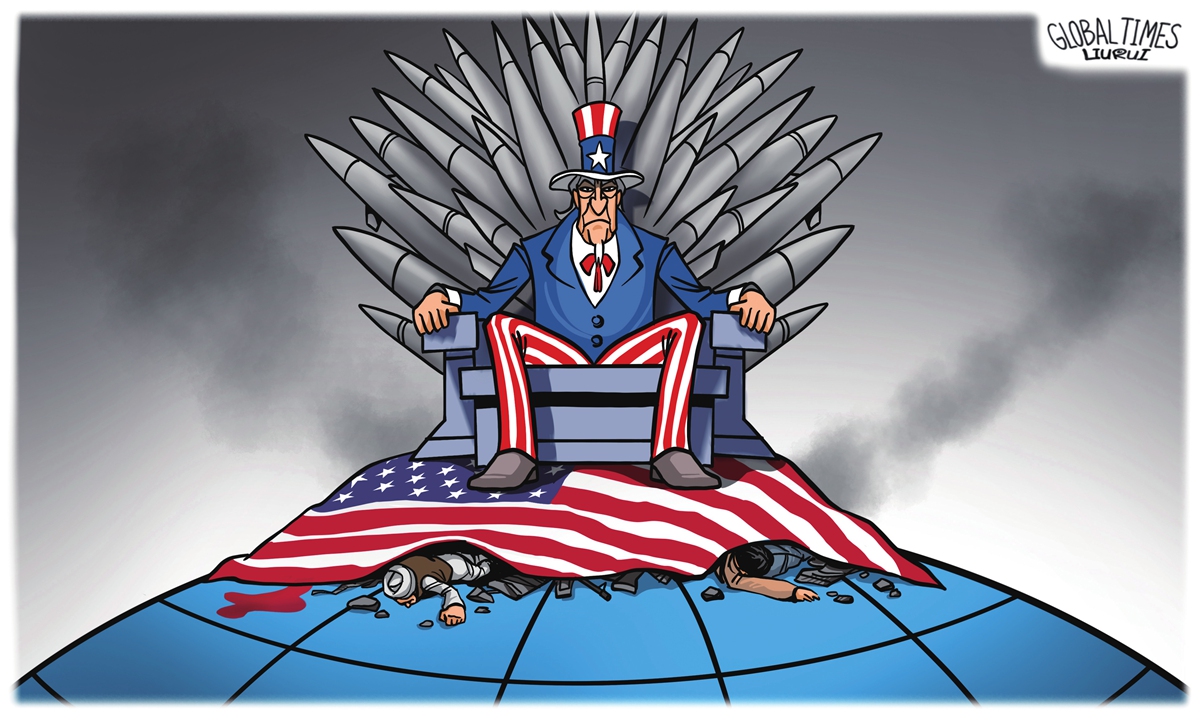
House of Hegemony Illustration: Liu Rui/GT
Charles Richard, the head of US Strategic Command, which oversees the nuclear arsenal, warned Congress Wednesday that Washington faces a "heightened nuclear deterrence risk when it comes to Russia and China," claiming that China is "watching the war in Ukraine closely and will likely use nuclear coercion to their advantage in the future." He also warned the lawmakers that the US is facing "a crisis deterrence dynamic right now that we have only seen a few times in our nation's history."
Sensationalizing China's "nuclear threat" to justify actual US nuclear expansion has become a familiar trick of Washington. Last month, Richard told lawmakers at a closed-door hearing that China's "breathtaking expansion" of its strategic and nuclear arsenal is a quickly escalating risk for the US. In March, he said he is "very concerned" about potential "cooperative aggression" from China and Russia. If the efforts are to expand the budget for the department he's in charge, Richard made it - according to the Biden administration's recently submitted fiscal year 2023 defense budget, total spending on nuclear weapons and systems research and procurement grew to $34.4 billion from $27.7 billion for fiscal year 2022.
Of course, this is part of Washington's series ways to justify its arbitrary "nuclear freedom" and "nuclear hegemony" by pretending to worry that "deterrence is no longer sufficient." That is why politicians and media in Washington either hype disinformation like "China is building missile silos in its northwest part," or promote ridiculous fantasies, such as "China might use nuclear weapons in the Taiwan Straits," based completely on hypothetical assumptions. In the Russia-Ukraine conflict, it was the US and Western media and politicians who hyped the risk of nuclear war and wanted to "bind" China to Russia, even though China had nothing to do with the war.
These public opinion campaigns were "complemented" by a substantial step-by-step erosion of nuclear weapons limitations from the US. The Biden administration on one hand continues the nuclear weapons modernization efforts it inherited from the Trump administration. It increases investment to accelerate upgrading nuclear weapons and their delivery system, and maintain a low threshold for the use of nuclear weapons. On the other, the Biden administration has not corrected its predecessor's behavior of withdrawing from Intermediate-Range Nuclear Forces Treaty, which has undermined the international arms control system. The US has also further extended its nuclear forces beyond its territory. Under the leadership of Washington, NATO has expanded the scope of its "nuclear sharing" arrangements and actively promoted the forward deployment of nuclear weapons. And there have been voices in countries like Japan calling for "nuclear sharing" with the US.
Everyone knows that the US is already the "nuclear giant" on earth. According to the estimation of foreign think tank on arms control, the number of nuclear warheads in the US and NATO member countries is about 20 times that of China's. The amount of China's nuclear weaponry and that of the US and its NATO allies is not on the same level. The US sits on the world's largest nuclear arsenal, splashes huge sums of money to modernize its nuclear weapons and constantly relaxes the restrictions of using nuclear weapons. The risk of strategic misjudgment caused by all those will be incalculable.
China's nuclear policy is open and transparent. Of all five nuclear weapon states in the world, China is the only one that pledges no-first-use of nuclear weapons. China has made it clear it will not engage in any nuclear arms race with any other country and will keep its nuclear capabilities at the minimum level required for national security.
This means that the development of China's nuclear force has its own established pace and China will not dance to the tune of US hype. In contrast, Washington has deliberately upheld strategic ambiguity on the use of nuclear weapons, trying to leave room for self-interpretation for the use of nuclear weapons in the future. People seem to see that Washington is pointing at other people's noses with one hand, while its other hand is quietly unscrewing the bottle and letting the devil out.
A nuclear war cannot be won and must never be fought. At the beginning of this year, leaders of five nuclear weapon countries, China, Russia, the US, the UK and France, issued the Joint Statement on Preventing Nuclear War and Avoiding Arms Races, which stressed it again. It also expressed the common willingness to avoid military confrontation and prevent arms race. Washington should honor its commitment, rather than make petty moves of an arms race while shouting "deterrence crisis." On the nuclear issue, the "absolute advantage" and "absolute security" it pursues doesn't exist at all. Its strange logic will make all countries, including the US, feel unsafe. Washington should not be stubborn and should wake up in time.




